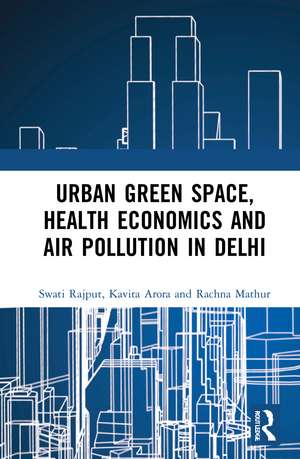Urban Green Space, Health Economics and Air Pollution in Delhi
Autor Swati Rajput, Kavita Arora, Rachna Mathuren Limba Engleză Paperback – 25 sep 2023
With an emphasis on the environmental issues facing the city of Delhi, the volume focuses on steps to preserve and manage the city’s urban green spaces. It explores the concept of urban green spaces and their economic, social, health, and psychological significance in cities. Drawing from their fieldwork and research in Delhi, the authors identify the sources of pollution in the city and access the role of urban green spaces in countering adverse effects. They further examine the relationship between green spaces and social and economic development, urban health, and urban governance. They highlight the good practices followed by other global cities. The volume also offers suggestions and policy recommendations to reverse and recover ecological balance in cities.
This book will be of interest to students and researchers of environment and ecology, public health, urban planning and governance, development studies, urban geography, urban sociology, resource management and health economics. It will also be useful for policy makers, and NGOs working in the areas of sustainability, urban planning and management and environmental preservation.
| Toate formatele și edițiile | Preț | Express |
|---|---|---|
| Paperback (1) | 383.13 lei 6-8 săpt. | |
| Taylor & Francis – 25 sep 2023 | 383.13 lei 6-8 săpt. | |
| Hardback (1) | 765.26 lei 6-8 săpt. | |
| Taylor & Francis – 30 mar 2021 | 765.26 lei 6-8 săpt. |
Preț: 383.13 lei
Nou
Puncte Express: 575
Preț estimativ în valută:
73.36€ • 76.39$ • 60.86£
73.36€ • 76.39$ • 60.86£
Carte tipărită la comandă
Livrare economică 12-26 februarie
Preluare comenzi: 021 569.72.76
Specificații
ISBN-13: 9780367710217
ISBN-10: 0367710218
Pagini: 192
Ilustrații: 42 Tables, black and white; 33 Line drawings, black and white; 22 Halftones, black and white; 55 Illustrations, black and white
Dimensiuni: 156 x 234 x 10 mm
Greutate: 0.45 kg
Ediția:1
Editura: Taylor & Francis
Colecția Routledge India
Locul publicării:Oxford, United Kingdom
ISBN-10: 0367710218
Pagini: 192
Ilustrații: 42 Tables, black and white; 33 Line drawings, black and white; 22 Halftones, black and white; 55 Illustrations, black and white
Dimensiuni: 156 x 234 x 10 mm
Greutate: 0.45 kg
Ediția:1
Editura: Taylor & Francis
Colecția Routledge India
Locul publicării:Oxford, United Kingdom
Public țintă
PostgraduateCuprins
1.Introduction: Urban Green Spaces: concept and significance 2. Green Spaces of Delhi: A Journey from Past to Present 3. Breathing a Breathless Way: Air Pollution in Delhi 4. The Health Challenges in Delhi 5. Healthcare Management: Investment and Expenditure 6. Green Health Insurance: Willingness to Pay 7. Conclusion and Suggestions
Notă biografică
Swati Rajput is a faculty member in the department of geography, Shaheed Bhagat Singh College, University of Delhi. She has 20 years of experience teaching geography in Delhi University. Her subject expertise includes environment, agriculture, urban and tourism geography.She is the editor of the book, Sustainable Smart Cities: Challenges and Future Perspective. She was awarded as the National Resource Person in Social Sciences by the Ministry of Human Resource Development and United Nations FPA. She has contributed to various national and international books and peer reviewed journals. She has also recorded various modules for e-PG Pathshala and Massive Open Online Courses (MOOC) (National Institute of Open School [NIOS]) under a Ministry of Human Resource Development (MHRD) initiative. She is a Gold medallist (Delhi University) and rank holder throughout academics.
Kavita Arora is the author of a book Indigenous Forest Management in Andaman & Nicobar Islands, India. She has published her research in many reputed journals. She earned her Ph.D. in Political Geography from Jawaharlal Nehru University, New Delhi. She got Post -Doctoral Fellowship from Indian Council of Social Science Research (ICSSR), New Delhi and Rajeev Gandhi Institute of Contemporary Studies (RGICS), Rajeev Gandhi Foundation, New Delhi. She is currently working as an assistant professor of Geography at Shaheed Bhagat Singh College, University of Delhi, India. A political geographer with interests in development and environmental issues, her research focuses on forests, gender, indigenous knowledge, trans-border conservation and the socio-political dimensions of development.
Rachna Mathur is an assistant professor in the University of Delhi. She has been teaching economics for the last 13 years. She did her Ph.D. in Health Economics. Her areas of interest are health economics, money and financial markets and financial economics. She has published many research papers and presented papers in national and international conferences.
Kavita Arora is the author of a book Indigenous Forest Management in Andaman & Nicobar Islands, India. She has published her research in many reputed journals. She earned her Ph.D. in Political Geography from Jawaharlal Nehru University, New Delhi. She got Post -Doctoral Fellowship from Indian Council of Social Science Research (ICSSR), New Delhi and Rajeev Gandhi Institute of Contemporary Studies (RGICS), Rajeev Gandhi Foundation, New Delhi. She is currently working as an assistant professor of Geography at Shaheed Bhagat Singh College, University of Delhi, India. A political geographer with interests in development and environmental issues, her research focuses on forests, gender, indigenous knowledge, trans-border conservation and the socio-political dimensions of development.
Rachna Mathur is an assistant professor in the University of Delhi. She has been teaching economics for the last 13 years. She did her Ph.D. in Health Economics. Her areas of interest are health economics, money and financial markets and financial economics. She has published many research papers and presented papers in national and international conferences.
Descriere
This book looks at the ecological stress on cities and engages with challenges of reducing vulnerabilities and risks of pollution on the health, well-being and livelihoods of people living in developing countries. Cities are the world’s highest energy consumption and the biggest producers of toxic wastes and pollutants.
